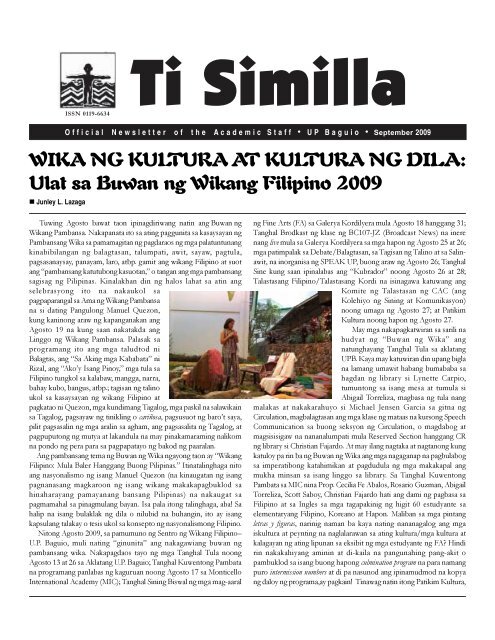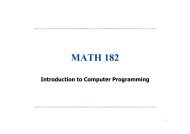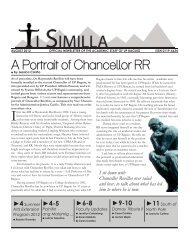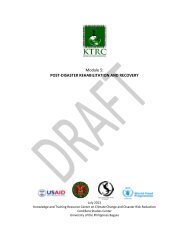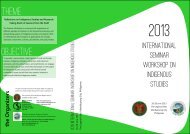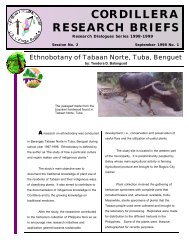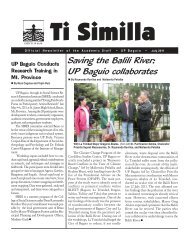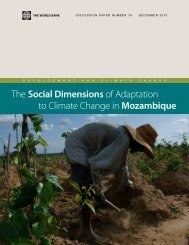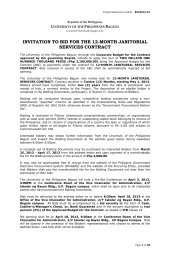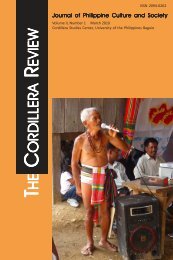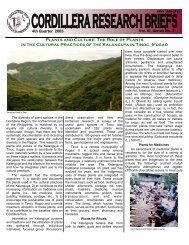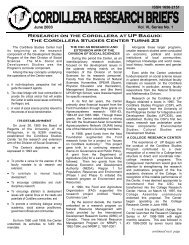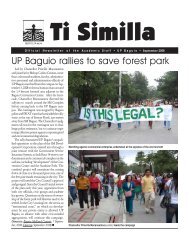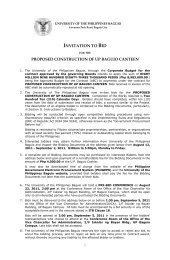WIKA NG KULTURA AT KULTURA NG DILA: Ulat sa ... - UP Baguio
WIKA NG KULTURA AT KULTURA NG DILA: Ulat sa ... - UP Baguio
WIKA NG KULTURA AT KULTURA NG DILA: Ulat sa ... - UP Baguio
Create successful ePaper yourself
Turn your PDF publications into a flip-book with our unique Google optimized e-Paper software.
Ti Similla<br />
ISSN 0119-6634<br />
O f f i c i a l N e w s l e t t e r o f t h e A c a d e m i c S t a f f • U P B a g u i o • September 2009<br />
<strong>WIKA</strong> <strong>NG</strong> <strong>KULTURA</strong> <strong>AT</strong> <strong>KULTURA</strong> <strong>NG</strong> <strong>DILA</strong>:<br />
<strong>Ulat</strong> <strong>sa</strong> Buwan ng Wikang Filipino 2009<br />
Junley L. Lazaga<br />
Tuwing Agosto bawat taon ipinagdiriwang natin ang Buwan ng<br />
Wikang Pamban<strong>sa</strong>. Nakapanata ito <strong>sa</strong> ating paggunita <strong>sa</strong> ka<strong>sa</strong>y<strong>sa</strong>yan ng<br />
Pamban<strong>sa</strong>ng Wika <strong>sa</strong> pamamagitan ng pagdaraos ng mga palatuntunang<br />
kinabibilangan ng balagta<strong>sa</strong>n, talumpati, awit, <strong>sa</strong>yaw, pagtula,<br />
pag<strong>sa</strong><strong>sa</strong>nay<strong>sa</strong>y, panayam, laro, atbp. gamit ang wikang Filipino at suot<br />
ang “pamban<strong>sa</strong>ng katutubong kasuotan,” o tangan ang mga pamban<strong>sa</strong>ng<br />
<strong>sa</strong>gi<strong>sa</strong>g ng Pilipinas. Kinalakhan din ng halos lahat <strong>sa</strong> atin ang<br />
selebrasyong ito na nakaukol <strong>sa</strong><br />
pagpaparangal <strong>sa</strong> Ama ng Wikang Pamban<strong>sa</strong><br />
na si dating Pangulong Manuel Quezon,<br />
kung kaninong araw ng kapanganakan ang<br />
Agosto 19 na kung <strong>sa</strong>an nakatakda ang<br />
Linggo ng Wikang Pamban<strong>sa</strong>. Pala<strong>sa</strong>k <strong>sa</strong><br />
programang ito ang mga taludtod ni<br />
Balagtas, ang “Sa Aking mga Kababata” ni<br />
Rizal, ang “Ako’y I<strong>sa</strong>ng Pinoy,” mga tula <strong>sa</strong><br />
Filipino tungkol <strong>sa</strong> kalabaw, mangga, narra,<br />
bahay kubo, bangus, atbp.; tagi<strong>sa</strong>n ng talino<br />
ukol <strong>sa</strong> ka<strong>sa</strong>y<strong>sa</strong>yan ng wikang Filipino at<br />
pagkatao ni Quezon, mga kundimang Tagalog, mga paskil na <strong>sa</strong>lawikain<br />
<strong>sa</strong> Tagalog, pag<strong>sa</strong>yaw ng tinikling o cariño<strong>sa</strong>, pagsusuot ng baro’t <strong>sa</strong>ya,<br />
pilit pag<strong>sa</strong><strong>sa</strong>lin ng mga aralin <strong>sa</strong> agham, ang pag<strong>sa</strong><strong>sa</strong>lita ng Tagalog, at<br />
pagpuputong ng mutya at lakandula na may pinakamaraming nalikom<br />
na pondo ng pera para <strong>sa</strong> pagpapatayo ng bakod ng paaralan.<br />
Ang pamban<strong>sa</strong>ng tema ng Buwan ng Wika ngayong taon ay “Wikang<br />
Filipino: Mula Baler Hanggang Buong Pilipinas.” Itinatalinghaga nito<br />
ang nasyonalismo ng i<strong>sa</strong>ng Manuel Quezon (na kinaugatan ng i<strong>sa</strong>ng<br />
pagnana<strong>sa</strong>ng magkaroon ng i<strong>sa</strong>ng wikang makakapagbuklod <strong>sa</strong><br />
hinaharayang pamayanang ban<strong>sa</strong>ng Pilipinas) na nakaugat <strong>sa</strong><br />
pagmamahal <strong>sa</strong> pinagmulang bayan. I<strong>sa</strong> pala itong talinghaga, aba! Sa<br />
halip na i<strong>sa</strong>ng bulaklak ng dila o nilubid na buhangin, ito ay i<strong>sa</strong>ng<br />
kapsulang talakay o tesis ukol <strong>sa</strong> konsepto ng nasyonalismong Filipino.<br />
Nitong Agosto 2009, <strong>sa</strong> pamumuno ng Sentro ng Wikang Filipino–<br />
U.P. <strong>Baguio</strong>, muli nating “ginunita” ang nakagawiang buwan ng<br />
pamban<strong>sa</strong>ng wika. Nakapagdaos tayo ng mga Tanghal Tula noong<br />
Agosto 13 at 26 <strong>sa</strong> Aklatang U.P. <strong>Baguio</strong>; Tanghal Kuwentong Pambata<br />
na programang panlabas ng kaguruan noong Agosto 17 <strong>sa</strong> Monticello<br />
International Academy (MIC); Tanghal Sining Biswal ng mga mag-aaral<br />
ng Fine Arts (FA) <strong>sa</strong> Galerya Kordilyera mula Agosto 18 hanggang 31;<br />
Tanghal Brodkast ng klase ng BC107-JZ (Broadcast News) na inere<br />
nang live mula <strong>sa</strong> Galerya Kordilyera <strong>sa</strong> mga hapon ng Agosto 25 at 26;<br />
mga patimpalak <strong>sa</strong> Debate/Balagta<strong>sa</strong>n, <strong>sa</strong> Tagi<strong>sa</strong>n ng Talino at <strong>sa</strong> Salinawit,<br />
na inorgani<strong>sa</strong> ng SPEAK <strong>UP</strong>, buong araw ng Agosto 26; Tanghal<br />
Sine kung <strong>sa</strong>an ipinalabas ang “Kubrador” noong Agosto 26 at 28;<br />
Talasta<strong>sa</strong>ng Filipino/Talasta<strong>sa</strong>ng Kordi na isinagawa katuwang ang<br />
Komite ng Talasta<strong>sa</strong>n ng CAC (ang<br />
Kolehiyo ng Sining at Komunikasyon)<br />
noong umaga ng Agosto 27; at Patikim<br />
Kultura noong hapon ng Agosto 27.<br />
May mga nakapagkatwiran <strong>sa</strong> <strong>sa</strong>rili na<br />
hudyat ng “Buwan ng Wika” ang<br />
natunghayang Tanghal Tula <strong>sa</strong> aklatang<br />
<strong>UP</strong>B. Kaya may katuwiran din upang bigla<br />
na lamang umawit habang bumababa <strong>sa</strong><br />
hagdan ng library si Lynette Carpio,<br />
tumuntong <strong>sa</strong> i<strong>sa</strong>ng me<strong>sa</strong> at tumula si<br />
Abigail Torreliza, magba<strong>sa</strong> ng tula nang<br />
malakas at nakakarahuyo si Michael Jensen Garcia <strong>sa</strong> gitna ng<br />
Circulation, magbalagta<strong>sa</strong>n ang mga klase ng mataas na kursong Speech<br />
Communication <strong>sa</strong> buong seksyon ng Circulation, o magdabog at<br />
magsisisigaw na nananalumpati mula Reserved Section hanggang CR<br />
ng library si Christian Fajardo. At may ilang nagtaka at nagtanong kung<br />
katuloy pa rin ba ng Buwan ng Wika ang mga nagaganap na pagbulabog<br />
<strong>sa</strong> imperatibong katahimikan at pagdudula ng mga makakapal ang<br />
mukha min<strong>sa</strong>n <strong>sa</strong> i<strong>sa</strong>ng linggo <strong>sa</strong> library. Sa Tanghal Kuwentong<br />
Pambata <strong>sa</strong> MIC nina Prop. Cecilia Fe Abalos, Ro<strong>sa</strong>rio Guzman, Abigail<br />
Torreliza, Scott Saboy, Christian Fajardo hati ang dami ng pagba<strong>sa</strong> <strong>sa</strong><br />
Filipino at <strong>sa</strong> Ingles <strong>sa</strong> mga tagapakinig ng higit 60 estudyante <strong>sa</strong><br />
elementaryang Filipino, Koreano at Hapon. Maliban <strong>sa</strong> mga pintang<br />
letras y figuras, narinig naman ba kaya nating nananagalog ang mga<br />
iskultura at peynting na naglalarawan <strong>sa</strong> ating kultura/mga kultura at<br />
kalagayan ng ating lipunan <strong>sa</strong> eksibit ng mga estudyante ng FA Hindi<br />
rin nakakahiyang aminin at di-kaila na pangunahing pang-akit o<br />
pambuklod <strong>sa</strong> i<strong>sa</strong>ng buong hapong culmination program na para namang<br />
puro intermission numbers at di pa nasunod ang ipinamudmod na kopya<br />
ng daloy ng programa,ay pagkain! Tinawag natin itong Patikim Kultura,
Report<br />
pantakam <strong>sa</strong> di-lamang pang-Agostong<br />
pagdiriwang <strong>sa</strong> yaman ng kultura at mga<br />
wikang Filipino.<br />
Dalawa ang pangunahing gamit ng dila:<br />
gamit <strong>sa</strong> panla<strong>sa</strong>, at gamit <strong>sa</strong> pag<strong>sa</strong><strong>sa</strong>lita.<br />
Sagi<strong>sa</strong>g ang dila ng panla<strong>sa</strong> — ang ating paraan<br />
ng pagtanggap at pagpili ng mga bagay-bagay,<br />
di lamang <strong>sa</strong> pagkain kundi maging <strong>sa</strong> iba pang<br />
material at kaisipan. Kaya nga’t ang tindi o<br />
<strong>sa</strong>hol ng dating ng pagkain, o anupaman, ay<br />
naka<strong>sa</strong>lalay <strong>sa</strong> ating “panla<strong>sa</strong>,” na nababatay<br />
naman <strong>sa</strong> ating karana<strong>sa</strong>n ng pagkakatikim<br />
dito. Ang hindi patok <strong>sa</strong> iyong panla<strong>sa</strong> ay hindi<br />
tatanggapin ng iyong sikmura.<br />
Sagi<strong>sa</strong>g din ang dila ng wika; <strong>sa</strong> <strong>sa</strong>litang<br />
lengua (dila) nga nagmula ang <strong>sa</strong>litang<br />
“lenggwahe,” <strong>sa</strong>pagkat ang dila nga ang waring<br />
maliwanag na ka<strong>sa</strong>ngkapan ng pag<strong>sa</strong><strong>sa</strong>lita.<br />
Kapwa <strong>sa</strong> pagkain (pagtanggap natin paloob<br />
<strong>sa</strong> ating katawan) at pag<strong>sa</strong><strong>sa</strong>lita (pagpapahayag<br />
ng mga diwain mula <strong>sa</strong> ating kalooban) tampok<br />
ang gampanin ng dila.<br />
Kapwa ang wika at pagkain din ang<br />
karaniwang mga palaging bida <strong>sa</strong> pag<strong>sa</strong><strong>sa</strong>lamin<br />
ng kultura. Sa lahat nga naman ng gawain ng<br />
tao, ang dalawang ito ang hinding-hindi<br />
mawawala. Sa anumang pagtitipon, ka<strong>sa</strong>ngkot<br />
ang dila.<br />
Itinatalinghaga ng palatuntunang ito ang<br />
napakahalagang gampanin ng wika <strong>sa</strong><br />
kamalayan ng pamayanang gumagamit o<br />
pinagmumulan nito. Sa ating pagdiriwang <strong>sa</strong><br />
Buwan ng Wikang Pamban<strong>sa</strong> muli nating<br />
ginugunita ang ka<strong>sa</strong>y<strong>sa</strong>yan at isinusulong ang<br />
sigla ng wikang Filipino, kaakibat ang<br />
paninindigan <strong>sa</strong> pagtataguyod ng ating patuloy<br />
na hinaharaya at inaakdang Ban<strong>sa</strong>.<br />
Kinakatawan ng iba’t ibang mga produkto ang<br />
yaman ng Pamban<strong>sa</strong>ng Wika dulot ng yaman<br />
ng bawat wikang bumubuo <strong>sa</strong> wikang Filipino.<br />
Sa dinami-dami ng ating mga<br />
pamban<strong>sa</strong>ng <strong>sa</strong>gi<strong>sa</strong>g –<br />
pamban<strong>sa</strong>ng punongkahoy,<br />
pamban<strong>sa</strong>ng bungang-kahoy,<br />
pamban<strong>sa</strong>ng dahon, pamban<strong>sa</strong>ng<br />
hayop, pamban<strong>sa</strong>ng ibon,<br />
pamban<strong>sa</strong>ng isda, pamban<strong>sa</strong>ng<br />
<strong>sa</strong>yaw, pamban<strong>sa</strong>ng unibersidad<br />
pamban<strong>sa</strong>ng katutubong<br />
kasuotan, pamban<strong>sa</strong>ng bahay,<br />
pamban<strong>sa</strong>ng bayani, pamban<strong>sa</strong>ng<br />
katutubong laro, “pamban<strong>sa</strong>ng<br />
sugal,” “pamban<strong>sa</strong>ng ulam,”<br />
“pamban<strong>sa</strong>ng tinapay,” “pamban<strong>sa</strong>ng<br />
kamao!,” “pamban<strong>sa</strong>ng insekto(),”<br />
“pamban<strong>sa</strong>ng problema” – i<strong>sa</strong> marahil ang<br />
pamakyaw na <strong>sa</strong>gi<strong>sa</strong>g <strong>sa</strong> ating pamban<strong>sa</strong>ng<br />
kaakuhan: ang ating “pamban<strong>sa</strong>ng dila.”<br />
Dila rin ang tumatalim, ‘ika nga, kapag<br />
nagiging higit na aral ang kamalayan ng i<strong>sa</strong>ng<br />
tao. Pangha<strong>sa</strong> <strong>sa</strong> kamalayan na naman ang<br />
ambag ng Talasta<strong>sa</strong>n ka<strong>sa</strong>ma sina Dr. Anna<br />
Christie Torres at Dr. Raymundo Rovillos.<br />
Ibinahagi ang mga papel, “The map, the poem,<br />
the Church, and William Henry Scott,<br />
postcolonially speaking” ni Dr. Torres, at<br />
“Paglikha At Paglarawan Sa Pagkakakilanlang<br />
Tinguian At Igorot Sa Kolonyal Na<br />
Etnograpiya (1843-1902)” ni Dr. Rovillos ang<br />
mahahalagang tuklas at datos <strong>sa</strong> kanilang mga<br />
<strong>sa</strong>liksik. Waring busog naman ang MPH <strong>sa</strong><br />
dami ng mga dumalo kapwa mga estudyante<br />
at mga guro. Umalinga<strong>sa</strong>w ang aroma ng<br />
kapeng Kalinga at Benguet at bango ng puto<br />
at tinapay mula <strong>sa</strong> Dane’s ka<strong>sa</strong>bay ng pagbaha<br />
ng excitement kapwa ng intelek at ng emosyon<br />
dulot ng mga panayam. Kape ang atmosperang<br />
nilikha ng mga panayam at tinapay na<br />
isinaw<strong>sa</strong>w <strong>sa</strong> kape ang mga reaksyon ng mga<br />
nagsipagdalo.<br />
Si Dr. Priscilla Supnet Macan<strong>sa</strong>ntos, ang<br />
t<strong>sa</strong>nselor ng <strong>UP</strong> <strong>Baguio</strong>, ang nagbigay ng susing<br />
talumpati <strong>sa</strong> pakikii<strong>sa</strong> ng <strong>UP</strong> <strong>Baguio</strong> <strong>sa</strong><br />
pagdiriwang ng Buwan ng Wikang Filipino<br />
2009. Ipinahayag ni T<strong>sa</strong>nselor Macan<strong>sa</strong>ntos<br />
ang pagkagalak na ang u<strong>sa</strong>ping wika at kultura<br />
na karaniwan <strong>sa</strong> ating nosyon na “malayo <strong>sa</strong><br />
bituka” ay nailapit nga <strong>sa</strong> bituka dahil <strong>sa</strong> tema<br />
ng pangwakas na programa. Nabanggit rin ni<br />
Dr. Purificacion Delima, dekana ng CAC, <strong>sa</strong><br />
pambukas na programa nang pasinayaan ang<br />
Tanghal Sining Biswal, ang mahalagang<br />
gampanin ng sining <strong>sa</strong> paglinang ng kamalayan<br />
di lamang ng indibidwal kundi ng bayan at<br />
lipunan. Kapwa sina T<strong>sa</strong>nselor Macan<strong>sa</strong>ntos<br />
at Dekana Delima ay patuloy na sumusuporta<br />
at umaa<strong>sa</strong> <strong>sa</strong> buong taong aktibong programa<br />
na nagtataguyod ng ating sining at kultura.<br />
Maliban <strong>sa</strong> pagkain at iba’t ibang produkto<br />
na iniambag ng kaguruan, mga estudyante,<br />
mga empleyado at ng <strong>UP</strong> KAISA, at ang<br />
paggawad ng mga gantimpala <strong>sa</strong> mga<br />
patimpalak, kinatampukan ang Patikim<br />
Kultura ng mga pagtatanghal: uggayam ni Mr.<br />
Saboy; mga awitin ng Tinig Amianan; at mga<br />
tanghal tula ng TABAK, mga klase ng Speech<br />
Communication 10 ni Mr. Garcia, nina Mr.<br />
Fajardo, at mga dating gurong sina Merci<br />
Dulawan at dating Prop. Francis Macan<strong>sa</strong>ntos.<br />
Ipinaabot ni Dr. There<strong>sa</strong> Manan<strong>sa</strong>la, ang<br />
tagapangulo ng Departamento ng Wika,<br />
Panitikan at mga Sining, ang pa<strong>sa</strong><strong>sa</strong>lamat <strong>sa</strong><br />
lahat para <strong>sa</strong> matagumpay na kainan kung <strong>sa</strong>an<br />
nabusog naman hindi lamang ang pisikal kundi<br />
ang kultural na aspeto at kamalayan ng bawat<br />
dumalo <strong>sa</strong> lahat ng programa ng buong<br />
buwang pagdiriwang. Higit na nabusog ang<br />
komite na binubuo nina Lynette Carpio,<br />
Michael Jensen Garcia, Junley Lazaga, Albert<br />
Paala, Cristian Carlo Suller, at Abigail<br />
Emmanuelle Torreliza. Hindi lamang pagtawid<br />
ng gutom kasi ang naganap nitong Agosto.<br />
Magiging buong-taong putahe ang ganitong<br />
mga gawain. Magiging bahagi ng kultura ng<br />
<strong>UP</strong>B ang ganito.<br />
2 TI SIMILLA September 2009
Opinion<br />
Whereto, Igorot<br />
Jimmy Fong<br />
Why would showbiz personality Candy<br />
Pangilinan suddenly blurt out the disclaimer in a<br />
show at SM <strong>Baguio</strong> that she was a human being<br />
and not an Igorot This is certainly worse<br />
than an earlier statement attributed to a Filipino<br />
statesman that Igorots were not Filipinos.<br />
After all the efforts that Igorots themselves<br />
have been doing hoping to change<br />
people’s perceptions of them, how do we<br />
make sense of this Is it possible that the<br />
negative connotations constructed throughout<br />
history have been embedded into the<br />
unconscious of people so that during unguarded<br />
moments these just come out<br />
In his talk called “Paglikha at<br />
Paglalarawan <strong>sa</strong> Pagkakakilanlang Tinguian<br />
at Igorot <strong>sa</strong> Kolonyal na Etnograpiya,” Prof.<br />
Raymundo Rovillos, dean of the College<br />
of Social Sciences, claims that the Tinguian<br />
has been constructed in the ethnographies as a<br />
peaceful people and who were willing to come<br />
within the pueblo or civilized town. The Igorot,<br />
on the other hand, was represented as <strong>sa</strong>vage and<br />
violent. As such, they have been demonized, which<br />
is no different from how certain contemporary<br />
groups have been branded as terrorists to justify<br />
attacks against them, he <strong>sa</strong>ys. Igorot then has become<br />
a signifier for bad people, and thus they have<br />
become legitimate objects of pacification and punitive<br />
actions by the colonizers.<br />
The presentation was part of Talasta<strong>sa</strong>n, the<br />
lecture series of the College of Arts and Communication<br />
spearheaded by the Sentro ng Wikang<br />
Filipino on August 27, 2009.<br />
Dean Rovillos <strong>sa</strong>id the ethnographic subjects,<br />
both Tinguian and Igorot, did not have the power<br />
to input into or question the written accounts about<br />
them especially that these were written in a foreign<br />
language. Still, he <strong>sa</strong>id, the Igorot has become the<br />
object of desire of the colonizers because of the<br />
gold within their territory.<br />
A related lecture showing the sustained interest<br />
in ethnicity studies in the University is “Mediating<br />
Igorot Indigeneity in the Virtual Dap-ay” on<br />
September 3, 2009 by Liezel Longboan, Research<br />
Affiliate of the Cordillera Studies Center, <strong>UP</strong><br />
<strong>Baguio</strong>. Former journalism faculty of the College<br />
of Arts and Communication, Longboan is a Ph.D.<br />
student at the School of Journalism, Media and<br />
Cultural Studies, Cardiff University, Wales.<br />
Photo courtesy of magkachi.wordpress.com<br />
Longboan claims that contrary to the description<br />
of the e-mail group Bibaknets as open to “every<br />
BIBBAKA/Igorot/Cordillera netizen, by birth,<br />
affinity or even just for the love of being associated<br />
with the names,” issues of participation, inclusion<br />
and exclusion can actually be observed from<br />
the interactions in the e-group. Longboan’s abstract<br />
states that as “the biggest and oldest e-mail group<br />
among all ethnicity-defined e-groups, Bibaknets is<br />
a discursive space where indigeneity and ethnic<br />
identity are being negotiated, challenged and redefined.”<br />
Using participant observation and being coopted<br />
as co-moderator of the e-group, Longboan<br />
has observed that the very “vocal” members tend<br />
to shot down the ideas of others particularly those<br />
that do not conform to their political views. The<br />
identities of those who express contrary views are<br />
also challenged and threatened to be excluded. The<br />
older members of the group also tend to castigate<br />
those who seem to display or express “un-Igorot”<br />
views and behavior. One of the items in the agenda<br />
of the Igorot Global Organization of which the<br />
online Igorots also maintain offline relations is<br />
“cleansing” the Igorot of its negative connotations<br />
so that those who shall be called the label will be<br />
proud .<br />
Questions on methodology, appropriateness<br />
of metaphors and the use of Igorot versus Cordilleran<br />
as identities were asked of Longboan. The<br />
idea that identity and Igorotness are negotiated<br />
and contested depending on who one<br />
is talking to or where one is located was<br />
also pointed out.<br />
But while academic interest in Igorots<br />
and the Cordillera still sustains several members<br />
of the faculty, the mostly Cordillera<br />
students who have been under the Program<br />
for Indigenous Culture, <strong>UP</strong> <strong>Baguio</strong>’s most<br />
recent version of its integration/affirmative<br />
action program for indigenous peoples,<br />
want to be heard on the reconceptualization<br />
of the program. In a recent Outcrop article,<br />
they were reportedly observed as isolating<br />
themselves, among other issues. They<br />
respond by <strong>sa</strong>ying that they do attend classes<br />
and join other student organizations and<br />
activities. Also, through the years they have always<br />
been the ones called upon, shoved to the frontlines<br />
to play gongs, sing and dance their butts off on<br />
important university occasions, including those at<br />
Diliman.<br />
At the Talasta<strong>sa</strong>n, a student asked what the<br />
relevance of the information on colonial ethnography<br />
on the Igorot to him was as a biology major.<br />
A long discussion followed.<br />
Candy Pangilinan was a <strong>UP</strong> student and once<br />
performed with a theater group at the Bulwagang<br />
Juan Luna of <strong>UP</strong> <strong>Baguio</strong>. Is it possible that <strong>UP</strong> has<br />
to exert more effort in deconstructing colonial texts,<br />
beyond academics, as no matter what Igorots do<br />
to try to change the image that other Filipinos have<br />
of them, including the aborted showbiz stint of<br />
the late Marky Cielo, nothing changes And that<br />
no program will ever undo the demons attached<br />
by ethnography and popular culture to the Igorot<br />
I have always been contending that while the national<br />
integration programs have succeeded in<br />
mainstreaming the Igorots so that you can actually<br />
find them almost everywhere, it is the nation that<br />
has failed to respond appropriately. I then propose<br />
for the conceptualization of a university program<br />
for the understanding of indigenous peoples, especially<br />
Igorots, as part of our avowed “service to<br />
the nation, commitment to the region.”<br />
September 2009 TI SIMILLA 3
Report<br />
CAC Launches Project for Special Education<br />
Carlo Suller<br />
To launch its year-long project of seminar-workshops<br />
on Increasing Competent<br />
and Committed Response to the Needs<br />
of School Learners with Language Difficulties,<br />
the College of Arts and Communication<br />
held a public forum entitled<br />
“Identifying Common Language-Related<br />
Difficulties of School Learners”<br />
on September 4, 2009 at the <strong>UP</strong>B Multipurpose<br />
Hall. Turnout of participants was<br />
overwhelming with some 150 delegates<br />
from the Cordilleras, Region 1 and Region<br />
2. Only 50 were originally expected to attend.<br />
The four-part seminar-workshop series<br />
is being done through the cooperative efforts<br />
of the CAC and the College of Education<br />
of <strong>UP</strong> Diliman. The aim of the first<br />
of the four-part seminar-workshop series<br />
was to survey the language learning-related<br />
problems prevalent in the area, which the<br />
specialists from the two <strong>UP</strong> campuses<br />
hope to address, if not solve. Target audience<br />
for the forum were Special<br />
Education(SPED) techers who, in some<br />
ways, are already specialists in the field.<br />
However, discussions and sharing done<br />
during the event likewise provided information<br />
and guidance to regular school<br />
teachers who also need information regarding<br />
the handling of special children<br />
in regular classes.<br />
Mrs. Nora Amowas, who teaches<br />
Grade 3 at SPED <strong>Baguio</strong>, delivered a status<br />
report in behalf of Mr. Fi-an Siding,<br />
principal of the SPED-DepEd of <strong>Baguio</strong><br />
city. The report clarified that SPED looks<br />
into providing support for both gifted and<br />
di<strong>sa</strong>bled learners and create an educational<br />
climate wherein these children may<br />
be able to achieve their full potential. Mrs.<br />
Amowas reported that there is a total of<br />
about 800 gifted and di<strong>sa</strong>bled students at<br />
present. She also identified the needs and<br />
concerns of SPED, these mainly being:<br />
more teachers, more teacher aids, trainings<br />
and workshops for the faculty, and updates<br />
on new trends in behaviors modification.<br />
The second phase of the lecture series<br />
will be a seminar-workshop titled “Intervention<br />
Strategies<br />
for Common Language-Related<br />
Difficulties<br />
of School<br />
Learners.” This is<br />
aimed at identifying<br />
language-related difficulties<br />
of school<br />
learners and providing<br />
intervention<br />
strategies for the<br />
mentioned difficulties.<br />
The second<br />
stage will also include<br />
an evaluation<br />
of the applicability of strategies in the Philippine<br />
setting.<br />
The third part is entitled “Materials Production<br />
and Intervention Strategies for<br />
School Learners with Common Language-<br />
Related Difficulties,” which is expected to<br />
be the occasion for presenting the principles<br />
and guidelines of materials production;<br />
preparing actual materials; and evaluating<br />
the materials produced.<br />
The series will culminate with the presentation<br />
of “A Manual on Intervention<br />
Strategies for School Learners” and the<br />
launching of the teacher manual on intervention<br />
strategies. During this phase, the<br />
contents of the teaching manual will be presented<br />
to SPED practitioners for their comments<br />
and reactions.<br />
Consultant for the entire series is Dr.<br />
Edilberto Dizon of <strong>UP</strong> Diliman, chairperson<br />
of the Special Education Area. Joining<br />
him will be facilitators who are also experts<br />
in the field of SPED: Maryola<br />
Manan<strong>sa</strong>la, May Cabutihan and Lutze-Sol<br />
Aplaon-Vidal.<br />
Project Coordinators are DLLA Chair<br />
Prof. There<strong>sa</strong> Manan<strong>sa</strong>la and CAC Graduate<br />
Resource Center Head Ria Guzman.<br />
4 TI SIMILLA September 2009
Feature<br />
<strong>UP</strong> BAGUIO HOLDS FIRST VARSITY NIGHT<br />
Jennifer G. Inovero<br />
For the first time since the 1960s, the Human Kinetics<br />
Program organized the first ever Varsity Night<br />
last Friday. August 14, 2009 at the Bulwagang Juan<br />
Luna which started at 7 p.m. and ended at 11 o’clock<br />
in the evening. The <strong>sa</strong>id program was conceptualized<br />
after the annual celebration of the Varsity Night of<br />
the College of Human Kinetics, University of the Philippines<br />
Diliman, showcasing all the athletes from the<br />
different varsity teams. The HKP felt that it is high<br />
time for the office and the University as a whole to<br />
recognize the <strong>UP</strong> <strong>Baguio</strong> athletes after many years of<br />
representing the University in athletic competitions.<br />
This year’s varsity night was themed: “Pagpupugay<br />
at Pagpaparangal <strong>sa</strong> Atletang Iskolar ng Bayan.” It was<br />
organized to serve as venue to be able to acknowledge<br />
and recognize the untiring efforts and “never<strong>sa</strong>y-die<br />
<strong>UP</strong> fighting spirit” of our very own <strong>UP</strong> <strong>Baguio</strong><br />
Maroons who are competing in the 23 rd Season of<br />
the <strong>Baguio</strong>-Benguet Educational Athletic League<br />
(BBEAL) which opened in August. This event served<br />
well to psyche up our athletes and give them a morale<br />
booster, especially with the overwhelming support<br />
given by the <strong>UP</strong> <strong>Baguio</strong> community. The <strong>UP</strong> <strong>Baguio</strong><br />
Dance Troupe, also recognized as a ‘varsity team’ rendered<br />
several dance numbers during the program was<br />
also formally introduced to the <strong>UP</strong> <strong>Baguio</strong> community<br />
during this event. The dance troupe’s repertoire<br />
for the evening included folk, social, modern, modern<br />
hip hop and modern contemporary dances.<br />
The athletes comprising the different teams—badminton,<br />
basketball, chess, lawn tennis, table tennis,<br />
taekwondo, and volleyball—<br />
both men and women, dressed<br />
in different colors, modeled in<br />
front of the crowd. An audio<br />
visual presentation of all varsity<br />
teams was prepared and presented<br />
by the Pi Sigma Fraternity<br />
and Pi Sigma Delta Sorority.<br />
In his welcome address,<br />
Dr. Alipio Garcia, Vice<br />
Chancellor for Academic Affairs,<br />
compared what a student<br />
assistant receives for 1 hour (P30.00/hour) compen<strong>sa</strong>tion<br />
to the amount an athlete receives for training<br />
allowance (P150.00 each month for a minimum of 40<br />
hours). That is barely 10% of what a student assistant<br />
receives. He further compared our athletes to OFWs<br />
who are considered ‘heroes’ in the country, with our<br />
athletes untiringly playing for <strong>UP</strong>. Training of our<br />
athletes is sometimes done after class hours all the<br />
way to late-night.<br />
Presentation of varsity teams was started by the<br />
lawn tennis team, followed by volleyball women, badminton<br />
(men and women), table tennis (men and<br />
women) and chess (men and women) for the first batch<br />
of presentors. Dr. Rosemary Gutierrez, OIC of the<br />
College of Science, remarked that our athletes are not<br />
only skilled but are also good in dancing, singing and<br />
modeling. She also recognized the efforts of the<br />
coaches who patiently rendered their services in training<br />
our athletes even if they too are not well compen<strong>sa</strong>ted.<br />
Moreover, she conveyed her mes<strong>sa</strong>ge to the<br />
athletes to strive for excellence that is the hallmark of<br />
<strong>UP</strong>.<br />
The second batch of presentations was started<br />
by volleyball men, basketball men, taekwondo and basketball<br />
women. Team coaches Geneva Simplina for<br />
badminton, Wilfredo Ramos for chess, Lando<br />
Florendo for Table Tennis, Jandy Gay-as for basketball<br />
men, Sotero Mendoza for basketball women,<br />
Danilo Eduardo for volleyball men, Ortez Gabol for<br />
volleyball women, Mike Ang for lawn tennis, Melvin<br />
Morte for Taekwondo and Mr. Perry Dafun, choreographer<br />
of the <strong>UP</strong> <strong>Baguio</strong> Dance Troupe also surprised<br />
the audience by sharing their talents in modeling<br />
before redering a “Jai Ho” dance number.<br />
The HKP coordinator then presented the coaches<br />
who then awarded the jackets to their respective athletes.<br />
Prof. Inovero also gave a brief speech recognizing<br />
the efforts of the athletes in representing <strong>UP</strong> in<br />
the BBEAL and other athletic meets. This was followed<br />
by an audio-visual presentation which she herself<br />
prepared.<br />
A generous meal from Don Henrico’s courtesy<br />
of Lawn Tennis coach Mike Ang, was shared by the<br />
athletes after the program.<br />
It was indeed a worthwhile effort for the HKP to<br />
hold this program for our athletes as we were not only<br />
able to boost their confidence and lift their spirits but<br />
we were also able to build camaraderie among the various<br />
varsity teams. Words may not be enough to describe<br />
how happy the athletes were at having finally<br />
been given the much-deserved formal recognition in<br />
the <strong>UP</strong> <strong>Baguio</strong> community. The event likewise enabled<br />
the coaches to forge a stronger bond with each<br />
other after several nights of meeting and practicing<br />
for their dance numbers. The support that the HKP<br />
and the University gives to sports does not end with<br />
this event. There are still more years of rigorous training<br />
for our athletes to achieve excellence in sports (of<br />
course with good academic records) so that they may<br />
proudly represent <strong>UP</strong>B in the coming athletic seasons<br />
of the BBEAL and other athletic meets. We wish our<br />
athletes the best in their games, win or lose. What matters<br />
more is how the game is played.<br />
We lose with pride, we win with all humility. That’s<br />
the <strong>UP</strong> Fighting spirit.<br />
(The HKP extends its thanks to all who lent their support to<br />
this activity.)<br />
September 2009 TI SIMILLA 5
Report<br />
<strong>UP</strong> <strong>Baguio</strong> JOINS 23 rd BBEAL SEASON<br />
Jennifer Inovero<br />
The 23 rd Season of the <strong>Baguio</strong>-Benguet<br />
Educational Athletic League (BBEAL)<br />
opened last August 19, 2009, Wednesday<br />
at the host unit Cordillera Career Development<br />
College’s (CCDC) gym in<br />
Buyagan, La Trinidad, Benguet. The theme<br />
for this season is “Revelry More Than Rivalry.”<br />
As early as eight-thirty in the morning,<br />
athletes from the different participating<br />
universities began to assemble outside the<br />
CCDC gym. The presidents/heads/chancellor<br />
of the participating schools were<br />
seated on the stage, with the athletic directors<br />
in front of them, awaiting the parade<br />
of their athletes.<br />
The opening program started a little<br />
later than nine o’clock, with a welcome<br />
‘palabas’ rendered by the Kabayan Bendian<br />
elders. Next came the entrance<br />
of athletes from the different<br />
participating schools starting<br />
from the previous season’s host,<br />
our very own University of the<br />
Philippines <strong>Baguio</strong> Maroons<br />
(<strong>UP</strong>B), followed by St. Louis University<br />
Navigators (SLU), Philippine<br />
Military Academy Cavaliers<br />
(PMA), University of the Cordilleras<br />
Jaguars (UC), <strong>Baguio</strong> Central<br />
University Eagles (BCU),<br />
Pines City Colleges Warriors<br />
(PCC), University of <strong>Baguio</strong> Cardinals<br />
(UB), Benguet State University<br />
Mu<strong>sa</strong>ngs (BSU) and the host school, Cordillera<br />
Career Development College Admirals<br />
(CCDC).<br />
The UB Voices and Graces <strong>sa</strong>ng the Invocation<br />
and National Anthem<br />
accompanied by the<br />
SLU Band. The unfurling<br />
of the BBEAL Flag came<br />
next then the opening remarks<br />
by the President of<br />
CCDC, Dean James Malaya.<br />
The different heads/<br />
presidents/chancellor of<br />
the different participating<br />
schools did the lighting of<br />
friendship and sportsmanship<br />
candles.<br />
Officials from CCDC<br />
also awarded plaques of appreciation to<br />
Chancellor Priscilla S. Macan<strong>sa</strong>ntos and<br />
Prof. Epifania Claur, previous hosts of the<br />
22 nd BBEAL Season. The unfurling of<br />
school banners was done by the athletic<br />
directors, and the oath of sportsmanship<br />
by the CCDC Admirals basketball men<br />
team captain. A ‘Mabuhay Palabas’ was finally<br />
rendered by the UC Pep Squad, followed<br />
by the declaration and formal opening<br />
of the 23 rd BBEAL season.<br />
It is indeed another competitive and<br />
fruitful BBEAL season to look forward to.<br />
Our very own <strong>UP</strong> <strong>Baguio</strong> Fighting Maroons<br />
have undergone difficult and tiring<br />
training sessions since June in preparation<br />
for this season. We wish our athletes the<br />
best in every game that they will play.<br />
OFFICE OF PUBLIC AFFAIRS<br />
<strong>UP</strong> BAGUIO<br />
2600 BAGUIO CITY, PHILIPPINES<br />
Ti Similla ISSN 0119-6634<br />
Published by the University of the Philippines <strong>Baguio</strong> through<br />
the Office of Public Affairs<br />
E-mail: opa@upb.edu.ph<br />
<strong>UP</strong> <strong>Baguio</strong> website: www.upb.edu.ph<br />
GRACE CELESTE SUBIDO, Editor<br />
JIMMY FO<strong>NG</strong>, RUTH TINDAAN, Associate Editors<br />
AMER AMOR, MELCHOR C<strong>UP</strong><strong>AT</strong>AN, JENNIFER INOVERO,<br />
FARA MARTIA MANUEL, DEEMSON MONES, ERLINDA PALAGANAS,<br />
SHEKINAH QUERI, PHOEBE CHLOE RAMOS, MARIE CHRIS RAMOYA,<br />
LETICIA TOLENTINO, FERDINAND VERIDIANO,<br />
DAZZELYN ZAP<strong>AT</strong>A, Staff Writers<br />
FREDERICK PEDREGOSA, Production<br />
ENTERED AS SECOND CLASS MAIL <strong>AT</strong> THE <strong>Baguio</strong> City Central Post Office,<br />
Upper Session Road, <strong>Baguio</strong> City WITH PERMIT NO. CAR-2007-09.<br />
The views and opinions expressed in TI SIMILLA do not neces<strong>sa</strong>rily reflect the collective stand of the<br />
academic staff or the official position of <strong>UP</strong> <strong>Baguio</strong>.


